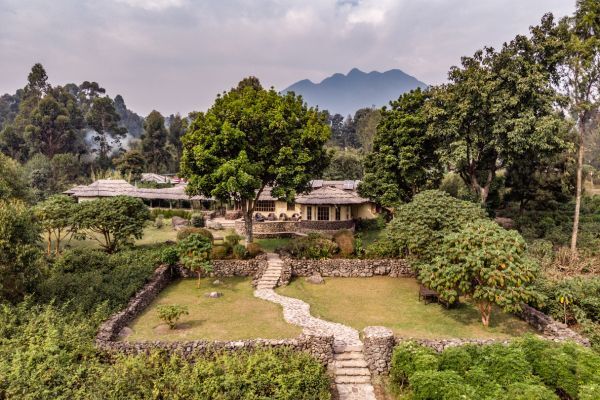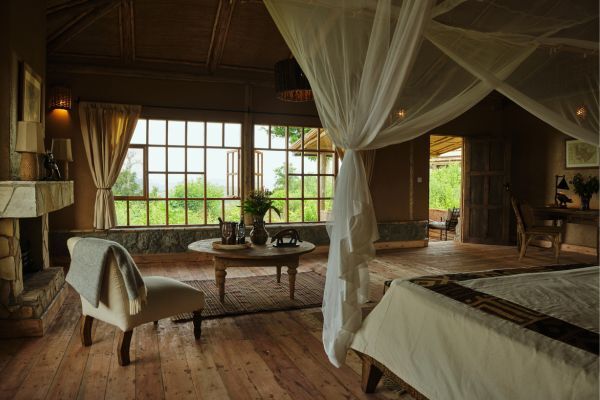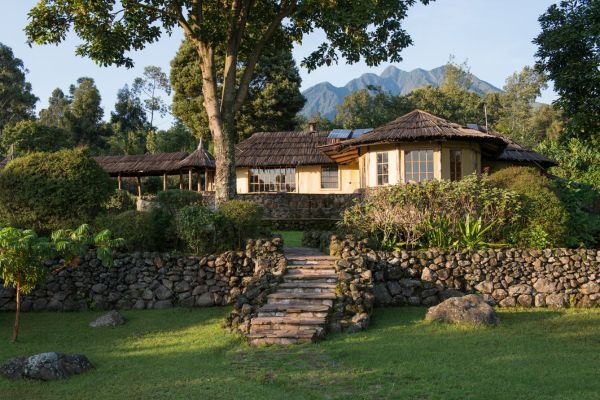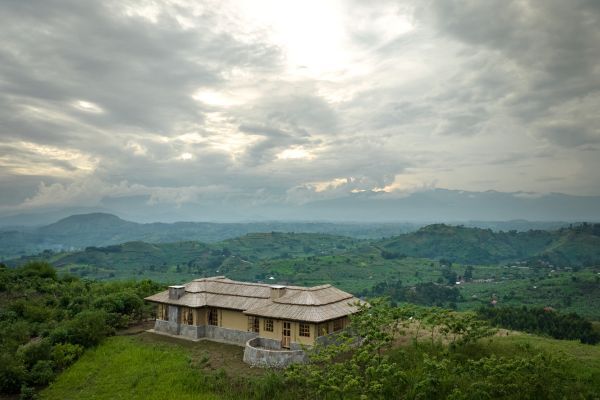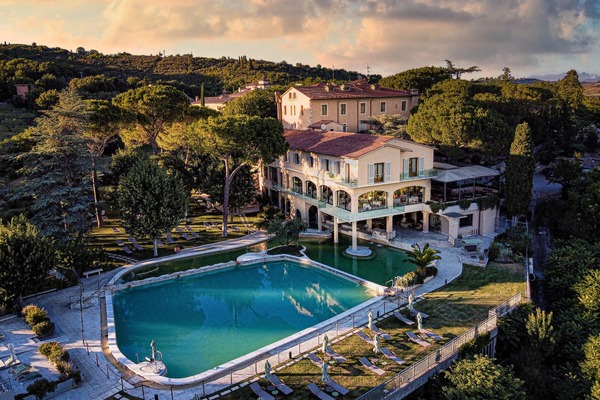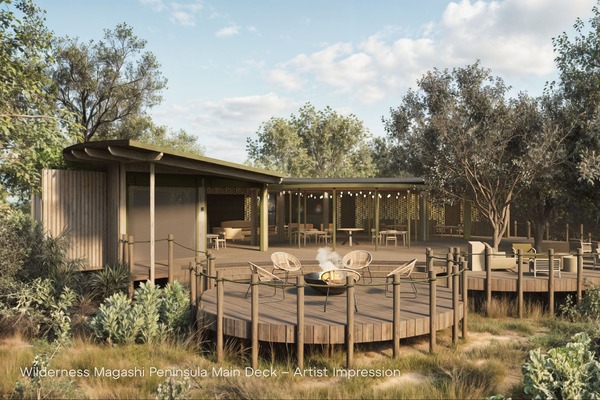There's more to Uganda than just gorillas: the company doing safari differently
Tracking primates in Uganda and Rwanda may be the bucket-list dream for many, but Volcanoes Safaris also offers pioneering conservation efforts alongside it.

Tracking primates in Uganda and Rwanda may be the bucket-list dream for many, but Volcanoes Safaris also offers pioneering conservation efforts alongside it.
As the afternoon sun casts a golden glow across a skyline of volcanic cones and fertile farming land, a circle of villagers gathers in front of a thatched-roof hut, clapping, singing, and beating drums.
Six women, wearing blue and yellow kitenge wraps, begin jumping and dancing to the music.
I am watching a Batwa dance, a unique expression of cultural heritage, often used to convey emotions and tell stories. For the Batwa, this dance captures the very essence of life in the mountain forests.
I’m here primarily to search for primates across Uganda and Rwanda with Volcanoes Safaris, which has just opened its fifth addition to the portfolio, Kibale Lodge. But meeting the Batwa first helps me understand the human side of wildlife conservation too. And though the scene looks idyllic, its past reality is another story.
The Batwa, or “keepers of the forest,” were the oldest surviving Indigenous tribe in Central Africa, living alongside gorillas for millennia before being forcibly evicted in 1991 when parts of the Virunga Mountains—a string of volcanic peaks straddling Rwanda, Uganda, and the Democratic Republic of Congo—were turned into national parks.
“Out of the forest, they weren’t shown where to go or what to be,” explains Ronald Hagumimana, project coordinator at Volcanoes Safaris. While gorilla populations increased, the Batwa became conservation refugees within their own country, living in dire conditions.
Today, with support from Volcanoes Safaris’ non-profit trust, more than 29 Batwa families have been resettled on the land where I am watching them dance, gaining access to education, health clinics, and space to grow food.
Nearby, a vocational centre sells handicrafts made by Batwa women, and a visitor heritage trail helps to keep forest skills alive and celebrated.
In addition to supporting the Batwa, the trust has also built water tanks, installed solar panels, and improved roads and schools for the villagers who live adjacent to the national parks.
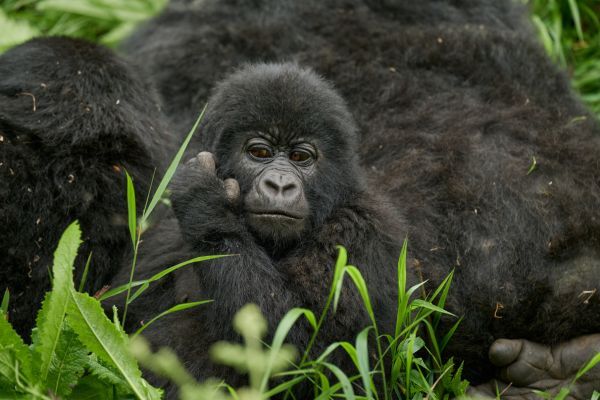
Committed to Care
Founded in 1997 by Ugandan-born Praveen Moman, Volcanoes Safaris played a key role in reviving tourism in Rwanda and Uganda after years of conflict and displacement, blending high-end tourism with sustainable practices that uplift local communities while protecting endangered primates.
Moman believes that for conservation to be successful, communities must benefit. He tells me that to conserve a landscape and protect wild animals, local people need to be at the heart of the conservation effort.
Now celebrating 25 years, Volcanoes Safaris is the only company in the world to focus exclusively on the gorilla and chimpanzee parks of Uganda and Rwanda.
The company now operates five lodges in its safari circuit, and with the arrival of Kibale Lodge, it has launched a new 10-day Primates of the Great Rift Valley safari that explores landscapes and wildlife across the Albertine Rift.
Guests are treated to spectacular wildlife experiences found nowhere else on Earth, and can stay in low-key, “afro-chic” lodges and camps designed to be sensitive to the culture and people of central Africa.
From Volcanoes’ Mount Gahinga Lodge, I trek up into Mgahinga National Park in search of the only family that has been allowed to remain in the forest: the Nyakagezi gorilla clan. Moman describes the region as “a forgotten place on Earth, a lost paradise, covered with strange, ethereal afro-montane forest with huge bamboo and moss-covered hagenia trees”—and the gorillas make this place feel even more like Eden.
Within a bamboo glade, I find the family of nine and gaze in awe. I’d been told that some people cry at the experience, and I can well believe it.
One silverback, his black fur being carefully combed by two females, lets out a big sigh, as if this is all just too tiresome for him. The youngest member, still a baby, stumbles into the clearing and begins play-fighting with another juvenile, flashing his teeth and beating his small chest in mock combat.
Mountain gorilla numbers have been threatened for years by a variety of hazards, including limited habitat, poaching, snares, diseases, and small population sizes.
Numbers slumped to around 290 in the 1970s, but today they stand at more than 1,000 across the Virunga Mountains and Bwindi. This success is primarily due to sensitive, responsible tourism, which not only provides a livelihood for nearby communities but also contributes to conservation.
“With no tourism, no one will take an interest in the forgotten forests of Africa,” says Moman, adding that people evicted from or living on the margins of parks need to see the value of gorillas if they are to safeguard them.
Today, people can make a living working in tourism as porters, guides, rangers, souvenir sellers, or lodge staff. Crucially, 10% of the costly permits ($800 in Uganda and $1,500 in Rwanda) goes to communities living around the national parks.
Money from tourist permits also helps fund protection against poaching and further habitat loss. However, tourism is heavily regulated to reduce the impact of human presence on the gorillas. Visitor numbers are limited to only eight people per day per habituated gorilla family, which explains why permits are so expensive.
It’s a similar story in Kibale National Park, 400 km north of Mgahinga in western Uganda. Prior to becoming a national park in 1993, poaching was rampant. But today, the protected forest is one of the best places in the world to see chimpanzees, home to around 1,500 individuals, along with 12 other primate species, including red colobus and olive baboons.
Outside the park, an important wildlife corridor, Bigodi, is managed and protected by the local community, in part because profits from tourism support livelihoods and fund village projects.
I ask military-trained ranger Jane Muthahina if we’ll be lucky enough to spot chimpanzees here, given the high numbers. “I have a 95% success rate,” she tells me. Scrambling behind her through swampy mud and alongside a forest elephant’s tracks, success indeed comes when we hear a chimpanzee’s “pant hoots”—loud screams rising in volume, pitch, and tempo before a large male chimp bursts into view.
The roads surrounding Kibale Lodge are lined with coffee and corn plantations. There are six deluxe and two standard bandas at the lodge (all-inclusive room rates start from $990 a night), all of which are spacious. My papyrus-thatched banda boasts a huge living room with an open fireplace and cozy corners to curl up with one of the many thoughtfully placed books on Africa.
Next door, a luxuriously large bed looks out over the sweeping green Ugandan landscape, and an outdoor rainforest shower helps soothe aching muscles. There is also a small communal pool to plunge into, overlooking those rural vistas, and a stone-built outdoor sauna to sweat it out.
Volcanoes Safaris’ lodges are sensitive to local culture and aesthetics, offering understated luxury. All bandas are hand-built by nearby artisans using natural materials, and everything inside—from the intricately carved coffee tables and lampstands to the patterned kitenge bathrobes and bronze sculptures from the Rwenzori Sculpture Foundation near Kibale Lodge—is a celebration of local craftsmanship.
The majority of Volcanoes Safaris’ staff are from the region, and the hospitable, warm Batoro culture is evident in the sound of gentle singing outside my door when coffee is brought to me at dawn, rather than an abrupt wake-up call.
My last stop is Virunga Lodge in Rwanda, where I head to track the endearing but endangered golden monkey, endemic to this region, and to visit the Ellen DeGeneres Campus of the Dian Fossey Gorilla Fund to learn more about the woman who laid the groundwork for modern gorilla conservation efforts.
Volcanoes Safaris has worked for 20 years with the Fossey Fund, and also partners with a range of other conservation groups, including Dr. Jane Goodall’s Roots and Shoots programme, which brings environmental education into local schools.
My week was a rare opportunity to not only witness the incredible wildlife here but also to hear the human stories that help preserve this unique region of Africa. Tourism is often criticised when it comes to protecting nature, but a primate safari with Volcanoes Safaris shows how conservation and tourism can thrive together.
“If we want forests and gorillas to survive, we must focus on the people. That is Volcanoes’ great ape eco-tourism model,” concludes Moman.
How to book it
Rainbow offers a nine-day trip to Uganda from £9,905pp, based on March 2025 departures, with two nights in No 5 Boutique Hotel in Entebbe on a B&B basis (one at the beginning and one at the end of the trip); three nights in Volcanoes Safaris’ Kibale Lodge and three nights in Mount Gahinga Lodge, with all meals and drinks, laundry services, massages and activities included. Price also includes international flights; all domestic flights in Uganda; private transfers and private transportation in 4-wheel drive vehicles; all guides and trackers; tracking permit; national parks permits and park ranger fees.
